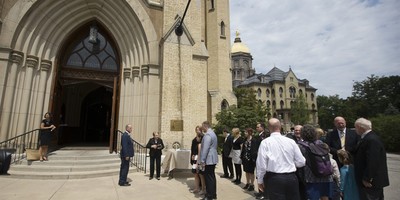Something about the Christmas season heightens the contrast between what should be and what is. A whimsical Christmas commercial ends and the 10 o'clock news begins: A precious young woman is in a coma, the teenage shooter is dead.
Merry holiday music plays in the doctor's office when a man hears the cancer has returned. It strikes a discordant note. At a crowded Christmas party, a widow reaches to hold a hand that is no longer there and feels more alone than ever. At times, it is hard to reconcile the cheer of the season and the hardships of life.
Poet Henry Wadsworth Longfellow felt that empty space on Christmas Day in 1863. He was caring for his son Charles, who had been badly wounded in battle. Charles' mother, Henry's beloved second wife, Fanny (his first wife had died after a miscarriage), was killed just 18 months before in an accidental fire. Henry had tried to save her and was so badly burned he could not attend her funeral. The iconic bushy beard he wore henceforth was grown to hide disfiguring burn scars. Henry wrote a friend that "He was outwardly calm but inwardly bleeding to death" from grief.
Henry Wadsworth Longfellow in 1868. (Photo by Julia Margaret Cameron, Wikicommons)
As the Civil War raged on, Henry, an abolitionist, worried he might lose his country. The casualties were great that year — 51,000 in the Battle of Gettysburg alone. Stealing moments away from caring for his son, Henry wrote a poem we have come to know as a carol: "I Heard the Bells on Christmas Day."
Recommended
The fourth and fifth stanzas speak of how war had "rent the hearth-stones of a continent" and cannon roar had drowned out the carols. The sixth stanza reveals the broken heart of the poet in response to war, death, and pain.
And in despair I bowed my head;
"There is no peace on earth," I said;
"For hate is strong, And mocks the song
Of peace on earth, good-will to men!"
His pen did not linger there, however. He ended the song on a different note:
Then pealed the bells more loud and deep:
"God is not dead, nor doth He sleep;
The Wrong shall fail, The Right prevail,
With peace on earth, good-will to men."
As Charles' caretaker and a vocal abolitionist, Henry had not merely hoped that right would be prevail; he labored on its behalf. He found the courage to stand in the space between what should be and what is. Charles would later recover. The Union won the Civil War, and slavery was abolished.
In a recent homily, Pope Francis spoke of "The danger of complacency, comfort, worldliness in our lifestyles and in our hearts, of making our well-being the most important thing in our lives." He contrasted those who "find their security in themselves and in material things" and those who are full of love, charity, "endurance and perseverance, able to face difficulties, trials and failures with serenity and hope in the Lord ... gentle, capable of understanding and mercy."
The key to reconciling Christmas hope and the reality of pain is not to ignore suffering or yield to a thousand shiny distractions. We must embrace those who are hurting, comfort the widowed, the sick and the dying, befriend the lonely, and feed the hungry. Faith and hope should motivate us to action. Poor shepherds who first heard the words, "peace on earth, good-will to men" some 2,000 years ago, did not go back to sleep but turned their feet toward Bethlehem.
It is only through the pouring out of oneself for others rather than the pouring into oneself of complacency that we can reconcile the cheer of the season to the hardships of life.

























Join the conversation as a VIP Member